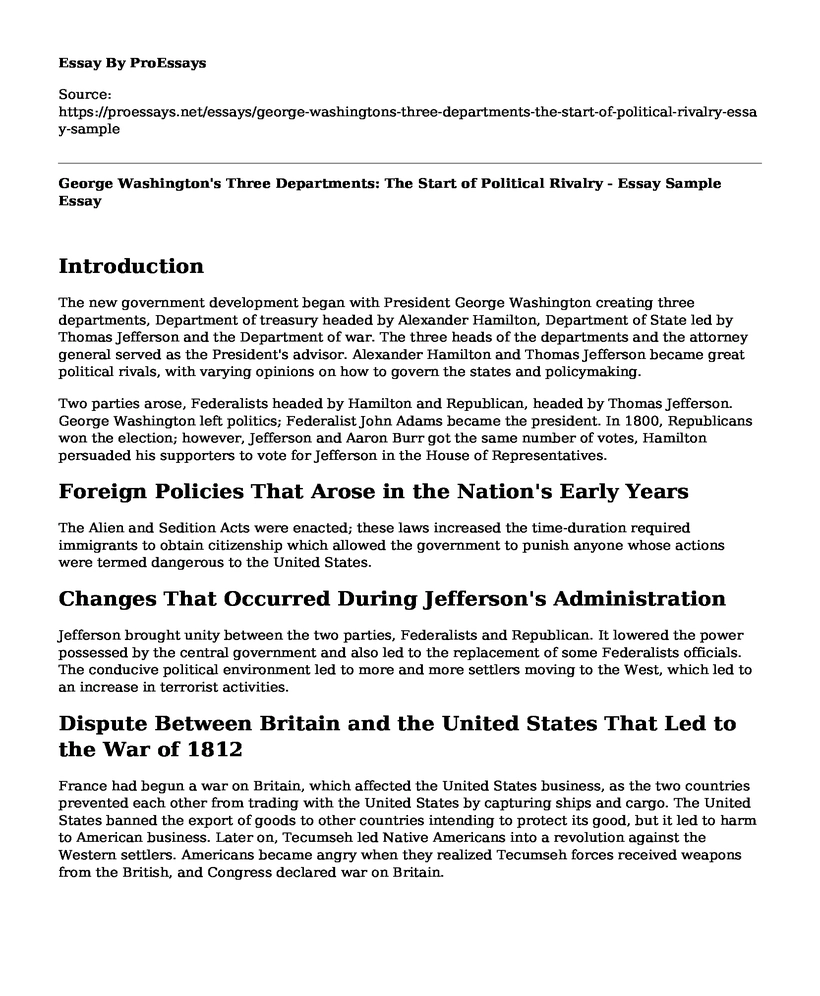Introduction
The new government development began with President George Washington creating three departments, Department of treasury headed by Alexander Hamilton, Department of State led by Thomas Jefferson and the Department of war. The three heads of the departments and the attorney general served as the President's advisor. Alexander Hamilton and Thomas Jefferson became great political rivals, with varying opinions on how to govern the states and policymaking.
Two parties arose, Federalists headed by Hamilton and Republican, headed by Thomas Jefferson. George Washington left politics; Federalist John Adams became the president. In 1800, Republicans won the election; however, Jefferson and Aaron Burr got the same number of votes, Hamilton persuaded his supporters to vote for Jefferson in the House of Representatives.
Foreign Policies That Arose in the Nation's Early Years
The Alien and Sedition Acts were enacted; these laws increased the time-duration required immigrants to obtain citizenship which allowed the government to punish anyone whose actions were termed dangerous to the United States.
Changes That Occurred During Jefferson's Administration
Jefferson brought unity between the two parties, Federalists and Republican. It lowered the power possessed by the central government and also led to the replacement of some Federalists officials. The conducive political environment led to more and more settlers moving to the West, which led to an increase in terrorist activities.
Dispute Between Britain and the United States That Led to the War of 1812
France had begun a war on Britain, which affected the United States business, as the two countries prevented each other from trading with the United States by capturing ships and cargo. The United States banned the export of goods to other countries intending to protect its good, but it led to harm to American business. Later on, Tecumseh led Native Americans into a revolution against the Western settlers. Americans became angry when they realized Tecumseh forces received weapons from the British, and Congress declared war on Britain.
Turning Point of the American War of 1812
A U.S naval fleet defeated Britain on Lake Erie and took control over Detroit. In 1814, the British entered Washington, to burn the Capitol and the White House, but they were defeated a period during which a peace treaty was signed ending the disputes.
Alien and Sedition Acts
These laws were passed during Adams reign as the president in response to citizens protest against the increased number of French settlers who were seen as a threat. It gave the government the powers to deport immigrants and also rose the number of years for acquiring citizenship and being eligible to vote from 5 years to 14 years.
Sedition Act prevented public opposition against the government by imposing fines and imprisonment to anyone who wrote, printed, spoke, or published any malicious information against the government. The laws were meant to control the public narrative against the government to maintain order. The purpose of these would be justified; however, it turned out that they were a total violation of human rights. Therefore I do not agree on the purpose of these laws to some extent.
Work Cited
History.com Editors. "Revolutionary War." History.com, A&E Television Networks, 29 Oct. 2009, https://www.history.com/topics/american-revolution/american-revolution-history.
Cite this page
George Washington's Three Departments: The Start of Political Rivalry - Essay Sample. (2023, Feb 15). Retrieved from https://proessays.net/essays/george-washingtons-three-departments-the-start-of-political-rivalry-essay-sample
If you are the original author of this essay and no longer wish to have it published on the ProEssays website, please click below to request its removal:
- American Horizons Questions Paper Example
- Essay Example on WW1: Britain & France Divide the Middle East
- How Liberalism Upholds the Public Good by Examining Power, Order, and Justice
- Nationalism & Business: Impact & Considerations - Essay Sample
- Essay on Examining US Aggregate Demand & Supply and Policy Impacts (1990s-2000)
- Essay Example on Obama Elected 44th US President: Historic Breakthrough for Diversity
- Revolutionary Ideas of Rene Descartes: Reforming Philosophy - Essay Example







